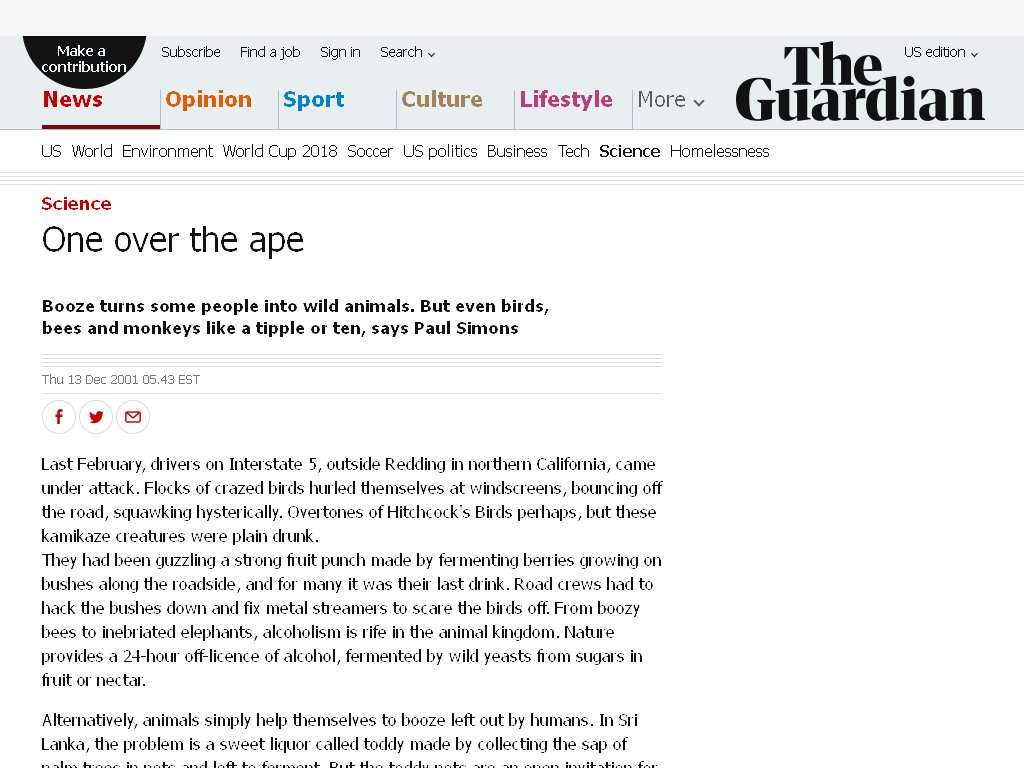They had been guzzling a strong fruit punch made by fermenting berries growing on bushes along the roadside, and for many it was their last drink. Road crews had to hack the bushes down and fix metal streamers to scare the birds off. From boozy bees to inebriated elephants, alcoholism is rife in the animal kingdom. Nature provides a 24-hour off-licence of alcohol, fermented by wild yeasts from sugars in fruit or nectar.
Alternatively, animals simply help themselves to booze left out by humans. In Sri Lanka, the problem is a sweet liquor called toddy made by collecting the sap of palm trees in pots and left to ferment. But the toddy pots are an open invitation for all-night raves attended by rats, bats, monkeys and the racoon-like toddy cat. According to the Sri Lankan Daily News, it is no joke.
"Toddy-tappers say their day's hard work has been destroyed, toddy contractors complain of loss of profits and the angry residents point out that they cannot peacefully sleep at night." Sri Lankan butterflies have also earned a bad reputation. They indulge themselves on fermenting berries, clinging on to them like hardcore drinkers slumped around a bar, sometimes for several days. But they often pay a terrible price - many suffer damaged wings from wild flapping, crashing to the ground or possibly getting into drunken brawls.
Yes, there are very real dangers to drunkenness among animals, yet there seems to be no shame attached to it. Except perhaps for honeybees. They are nature's hardest drinkers capable of knocking back 100% proof, or as one researcher remarked: "I know of no other organism that drinks pure ethanol, not even a college student."
In Australia, the summer heat ferments nectar and, according to the entomologist Errol Hassan, bees all too easily slip into alcoholism. "The bees can't find their way back to the hive, bang into trees or simply fall to the ground," he says. A drunken bee often faces disgrace back at the hive, ostracised by its teetotal fellows. "They are not allowed in by the guard bees at the entrance to the hive," Hassan says. "They are pushed away from the landing platform or attacked." And with good reason. If their fermented nectar was turned into alcoholic honey, it could end up paralysing the entire colony.
In fact, spiked honey tastes remarkably like mead and may have been its inspiration: a blend of fermented honey, water, malt, yeast and spices. Bees behave so much like human drunks, they are being recruited to help fight alcoholism. The drug Antabuse makes alcoholics ill to prevent them drinking, and when bees are given the drug they, too, stop their drinking.
Now new anti-alcohol drugs being developed in the US and Britain are being tested first on bees before they go to human trials. Animal alcoholism also has its uses in gardens. Slugs can be lured into a boozy death using beer and cider traps, but the whiff of alcohol also entices hedgehogs which get as drunk as skunks during all-night binges. They end up unconscious on the lawn, and Kay Bullen at the British Hedgehog Preservation Society warns of the dangers.
"If they're asleep outside during the day they could be attacked by birds or cats, when they should be curled up safe in their nests." It's not just hedgehogs at risk - she reports baby frogs also dipping into the booze and getting pissed as a newt. For some creatures, alcohol is more than just a recreational drug. Pine bark beetles use the scent of it to sniff out rotting tree stumps to colonise. Alcohol may even help some animals grow.
Scientists at Newcastle University have found that lug worms fed on beer grew three or four times faster than normal. Professor Peter Olive, head of marine sciences, sees the fattened worms as excellent fishfeed. "We don't really know why or how this works," he says. "But it means we have a new way of producing the raw product needed for fish farming."
Alcohol seems to be such a natural part of animal life you would think we were all born to booze. But there is at least one pillar of respectability; to the best of anyone's knowledge, starlings have never been seen intoxicated. Their secret is a powerful enzyme that breaks down alcohol so rapidly they can sink the human equivalent of several large whiskies and get rid of it 14 times faster than a man. If only there was a way of turning that to good use.
Last February, drivers on Interstate 5, outside Redding in northern California, came under attack. Flocks of crazed birds hurled themselves at windscreens, bouncing off the road, squawking hysterically. Overtones of Hitchcock's Birds perhaps, but these kamikaze creatures were plain drunk.

ItsMrQ on June 29th, 2018 at 02:46 UTC »
The animal world is looking more and more like a Pixar movie the older I get.
calico_crayon_ on June 29th, 2018 at 02:44 UTC »
Some bees die by dick explosion while mating and others rip their abdomens when they sting intruders. You'd think they'd at least be allowed to sleep on the couch after a night out.
darrylcarroll on June 29th, 2018 at 02:32 UTC »
and don't come back until you can beehive